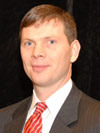Q&A with Matthew Chase, Executive Director, National Association of Development Organizations

Matthew Chase has served as the Executive Director of the National Association of Development Organizations (NADO) and the NADO Research Foundation since October 2003. Chase has extensive advocacy experience with federal, community, economic, and rural development programs, including successful campaigns to reauthorize the Economic Development Administration (EDA) in 1998 and 2004, establish the Delta Regional Authority in the early 2000s, and preserve annual funding for core rural development programs under USDA.
Q: As an organization, in what ways is the National Association of Development Organizations (NADO) strengthening the economic competitiveness of America's regions?
A: NADO focuses on promoting federal community and economic development policies that strengthen local governments, communities, and economies through regional solutions, partnerships, and strategies. Our main goal is to build stronger regional development organizations, including EDA's national network of 383 Economic Development Districts, through peer learning, broader implementation and sharing of noteworthy practices, and development of sound public policy.
Q: Are there specific Obama Administration initiatives that have impacted the work of the regional development organizations NADO represents?
A: Our members are excited about several administration priorities, including the new White House Council on Rural America and the President's emphasis on export trade and regional innovation. Our members agree that we need to address the fundamental building blocks for underserved and distressed areas, while also pursuing new areas of opportunity for economic growth. We share a common goal of building more resilient communities and a stronger employment base across the nation. As an organization focused on regional development, especially through partnerships with local government officials, we are pleased with the Obama administration's support for regional strategies and sustainable development.
Q: How is NADO promoting regional strategies that help to create job and economic growth?
A: NADO is working with our national membership to examine successful and emerging regional innovation models, including strategies to keep wealth and ownership locally. We are working with EDA and other federal officials to improve the coordination of federal resources and investments, including through EDA's Comprehensive Economic Development Strategy (CEDS) process. Most importantly, we remain committed to working with our members and partners to ensure America's local communities have the public assets required to sustain competitive private businesses: modern infrastructure (including broadband), talented workforce, access to affordable capital and quality of place.
Q: Discuss tools and resources that support local efforts to jumpstart economic ecosystems.
A: As noted during the EDA Know Your Region webinar series this year, regional collaboration among public, private and nonprofit sector leaders is essential in today's world. We need a convergence of ideas and skill sets across and within regions. This takes trust, leadership, and vision. One proven way to build this framework for collaboration is through sound data and information, including a mapping of regional assets, innovation, and institutional relationships. In today's tough budget environment, we need to be leveraging and coordinating public resources with private, nonprofit, and philanthropic investments. Most importantly, regions need to take a hard, honest look at their competitive advantages, including opportunities for export development.
We're exploring some creative models and partnerships around the nation, including partnerships between EDA's university centers and the Economic Development Districts. Kansas State University's Advancement Manufacturing Institute and the state's EDDs are piloting some great new work on regional innovation clusters in rural settings. EDDs in northern and eastern Maine are working hard to align their regional Workforce Investment Boards with their EDDs.


